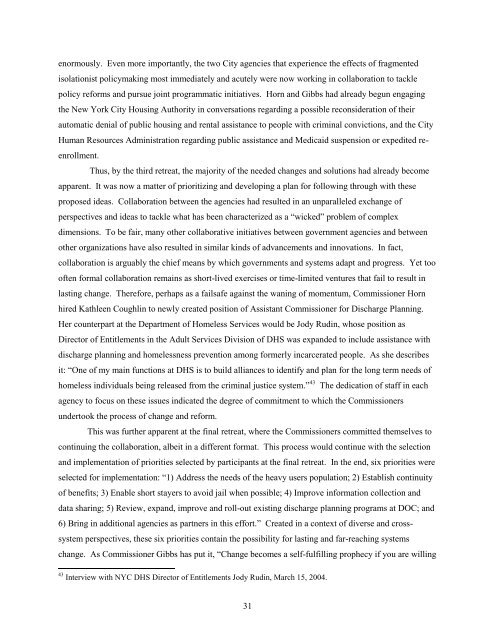Putting the Pieces Back Together: Overcoming Fragmentation to ...
Putting the Pieces Back Together: Overcoming Fragmentation to ...
Putting the Pieces Back Together: Overcoming Fragmentation to ...
You also want an ePaper? Increase the reach of your titles
YUMPU automatically turns print PDFs into web optimized ePapers that Google loves.
enormously. Even more importantly, <strong>the</strong> two City agencies that experience <strong>the</strong> effects of fragmented<br />
isolationist policymaking most immediately and acutely were now working in collaboration <strong>to</strong> tackle<br />
policy reforms and pursue joint programmatic initiatives. Horn and Gibbs had already begun engaging<br />
<strong>the</strong> New York City Housing Authority in conversations regarding a possible reconsideration of <strong>the</strong>ir<br />
au<strong>to</strong>matic denial of public housing and rental assistance <strong>to</strong> people with criminal convictions, and <strong>the</strong> City<br />
Human Resources Administration regarding public assistance and Medicaid suspension or expedited re-<br />
enrollment.<br />
Thus, by <strong>the</strong> third retreat, <strong>the</strong> majority of <strong>the</strong> needed changes and solutions had already become<br />
apparent. It was now a matter of prioritizing and developing a plan for following through with <strong>the</strong>se<br />
proposed ideas. Collaboration between <strong>the</strong> agencies had resulted in an unparalleled exchange of<br />
perspectives and ideas <strong>to</strong> tackle what has been characterized as a ―wicked‖ problem of complex<br />
dimensions. To be fair, many o<strong>the</strong>r collaborative initiatives between government agencies and between<br />
o<strong>the</strong>r organizations have also resulted in similar kinds of advancements and innovations. In fact,<br />
collaboration is arguably <strong>the</strong> chief means by which governments and systems adapt and progress. Yet <strong>to</strong>o<br />
often formal collaboration remains as short-lived exercises or time-limited ventures that fail <strong>to</strong> result in<br />
lasting change. Therefore, perhaps as a failsafe against <strong>the</strong> waning of momentum, Commissioner Horn<br />
hired Kathleen Coughlin <strong>to</strong> newly created position of Assistant Commissioner for Discharge Planning.<br />
Her counterpart at <strong>the</strong> Department of Homeless Services would be Jody Rudin, whose position as<br />
Direc<strong>to</strong>r of Entitlements in <strong>the</strong> Adult Services Division of DHS was expanded <strong>to</strong> include assistance with<br />
discharge planning and homelessness prevention among formerly incarcerated people. As she describes<br />
it: ―One of my main functions at DHS is <strong>to</strong> build alliances <strong>to</strong> identify and plan for <strong>the</strong> long term needs of<br />
homeless individuals being released from <strong>the</strong> criminal justice system.‖ 43 The dedication of staff in each<br />
agency <strong>to</strong> focus on <strong>the</strong>se issues indicated <strong>the</strong> degree of commitment <strong>to</strong> which <strong>the</strong> Commissioners<br />
under<strong>to</strong>ok <strong>the</strong> process of change and reform.<br />
This was fur<strong>the</strong>r apparent at <strong>the</strong> final retreat, where <strong>the</strong> Commissioners committed <strong>the</strong>mselves <strong>to</strong><br />
continuing <strong>the</strong> collaboration, albeit in a different format. This process would continue with <strong>the</strong> selection<br />
and implementation of priorities selected by participants at <strong>the</strong> final retreat. In <strong>the</strong> end, six priorities were<br />
selected for implementation: ―1) Address <strong>the</strong> needs of <strong>the</strong> heavy users population; 2) Establish continuity<br />
of benefits; 3) Enable short stayers <strong>to</strong> avoid jail when possible; 4) Improve information collection and<br />
data sharing; 5) Review, expand, improve and roll-out existing discharge planning programs at DOC; and<br />
6) Bring in additional agencies as partners in this effort.‖ Created in a context of diverse and cross-<br />
system perspectives, <strong>the</strong>se six priorities contain <strong>the</strong> possibility for lasting and far-reaching systems<br />
change. As Commissioner Gibbs has put it, ―Change becomes a self-fulfilling prophecy if you are willing<br />
43 Interview with NYC DHS Direc<strong>to</strong>r of Entitlements Jody Rudin, March 15, 2004.<br />
31

















